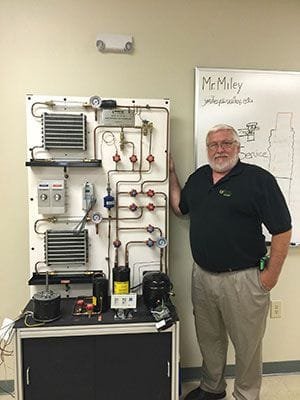 Once you have decided you want to become an HVAC technician, enrolling in Valley College is your next step. While we do everything in our power to ready you for a career in the heating, ventilation and air conditioning industry, it is ultimately up to you to do the best you can to achieve your goals. In an effort to help you rest easy with your decision to enroll in our HVAC School, we would like to give you a little information on what you can expect with and from the HVAC training you receive in our institution.
Once you have decided you want to become an HVAC technician, enrolling in Valley College is your next step. While we do everything in our power to ready you for a career in the heating, ventilation and air conditioning industry, it is ultimately up to you to do the best you can to achieve your goals. In an effort to help you rest easy with your decision to enroll in our HVAC School, we would like to give you a little information on what you can expect with and from the HVAC training you receive in our institution.
HVAC Service Training and Education
Several levels of education exist for HVAC service training.
- Community college and tech schools offer valuable certificate and associate degree programs that are helpful in gaining employment after graduation.
- Many employers prefer you have HVAC certification or a degree in some formal apprenticeship.
- Many programs offer classroom and on-hand experience. Our HVAC program offers both.
- HVAC training programs can take anywhere from six months to two years to complete.
Side Note: Apprenticeship programs can last anywhere from two to five years.
What You will Study with Heating and Air Conditioning Repair Training
Below are some of the areas you will study when you enroll in our HVAC training program.
- Motors and motor controls
- Automated HVAC controls
- HVAC unit maintenance
- Domestic appliances and cold water air conditioners
- Basics of electricity
- HVAC system installation
- Problem solving of air quality issues
- Commercial and industrial refrigeration units
The Gist of our HVAC Courses
Once you have enrolled in Valley College’s HVAC education program, you will begin to study many areas. These areas include theory and application of air conditioning and refrigeration, thermodynamic cycles, accessories, devices and refrigerants. You will also cover advanced topics related to commercial units that include installation, heat load calculations, low temperature systems and multiple system installs.
During your HVAC classes at Valley College, you will discover the basics of electrical control work and learn skills for using ladder diagrams, test meters, wiring diagrams and thermostats. Our advanced teachings review pneumatic and electronic controls and how to service and maintain both.
On the heating side of things, you will learn the principles of heating technology and appliances, which includes forced-air fuel gas, electrical, oil, combustion processes and heat pumps. Both residential and commercial applications are covered, as well as codes, venting and piping practices, too. We will even get into humidifiers, oil tanks, air cleaners and testing.
Also included in heating and ventilation training is steam and hot water systems typically used in both residential and commercial installs. This training involves boilers, circulators, pipes, traps, heat exchanges and controls. The basics of fabrication and sheet metal as they apply to HVAC ductwork is also a part of your education.
HVAC Certification and Licensing
Many states require HVAC technicians be licensed. Furthermore, the Environmental Protection Agency (EPA) requires any technician that works with refrigerant have HVAC certification in safe refrigerant handling. When you commit to the HVAC training program here at VC, we prepare you for the EPA exam.
HVAC Job Flexibility
HVAC technicians usually work a full 40-hour week. Sometimes they work evenings and weekends, as well as overtime, especially during peak hot and cold temperature seasons. Only a small percentage of heating and air conditioning technicians work less than 40 hours per week.
As an HVAC technician, you will work in a variety of locations and situations. Depending on the company you work for, you may be dispatched to office buildings, schools, stores, hospitals, shopping centers and other commercial locations, and you will be expected to travel to several locations throughout the course of a shift. Most service calls will require you to work indoors. However, should the faulty equipment be a heat pump or some other outdoor piece of equipment, you will need to be willing to work in all kinds of weather.
Industry Standards for HVAC Technician Salary
HVAC technicians are in high demand all over the country. Salaries vary from state to state, but you can expect to earn a decent income no matter where you decide to work. The average salary in the United States for an HVAC technician is about $40,000.
If you have decided you want to begin HVAC training in order to have an exciting career in heating, ventilation and air conditioning repair, contact the admissions office at Valley College today. We offer a 9-month training program that includes classroom and hands-on training so you are completely ready to begin your new career in less than a year. We also offer frequent start dates so you do not have to wait to begin your new journey.
